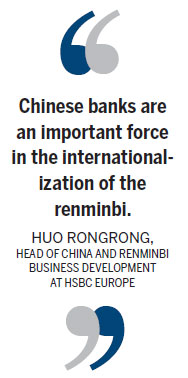A continental expansion

Top Chinese banks are seamlessly transitioning into the global financial system by establishing branches across Europe
Chinese banks are increasingly expanding into Europe to better internationalize the renminbi and integrate China's financial services into the global financial system.
The expansion has provided European investors opportunities to invest in China's domestic market and Chinese banks in Europe the flexibility to contribute to the continent's development of offshore renminbi activities, which is increasingly important for international trade and finance.
| Industrial and Commercial Bank of China's office in Luxembourg. Cecily Liu / China Daily |

The largest Chinese banks currently have overseas operations in major European financial centers such as London, Frankfurt, Paris and Luxembourg.
In Luxembourg, for example, Bank of China, Industrial and Commercial Bank of China and China Construction Bank have already established their European headquarters. BOC was the first Chinese bank to open a branch in the city, back in 1979.
In 1991, BOC then opened a subsidiary in Luxembourg to prepare for the bank's expansion into other European countries using the European Union's single passport policy. Five branches managed by BOC Luxembourg were subsequently established in Rotterdam, Brussels, Warsaw, Stockholm and Lisbon.
ICBC's expansion in Luxembourg follows a similar path. It established a representative office in 1998, which was quickly upgraded to a branch in 1999. In 2006, ICBC established a subsidiary in Luxembourg to prepare for the bank's continental expansion.
In October 2013, China Construction Bank became the third Chinese lender to set up European headquarters in Luxembourg.
Nicolas Mackel, CEO of Luxembourg for Finance, an agency for the nation's development of the financial centre, says the expansion of Chinese banks in Luxembourg has played a key role in helping the landlocked country grow its offshore renminbi activities. He adds that Chinese banks have greatly contributed to the city's renminbi deposits and loans.
Mackel says a number of European financial hubs are "cooperating by building off each of their strengths to create offshore renminbi activities.
Luxembourg's strengths, for example, in fund management, asset management and bond listing, help explain the high number of Luxembourg-incorporated funds investing in China and the large number of dim sum bonds - bonds issued outside China but denominated in the yuan - listed on the Luxembourg Stock Exchange.
BOC is also the first Chinese bank to establish in London. It opened an agency office in November 1929 with five employees and upgraded it to a branch in 1946.
BOC's footsteps in London has, in recent years, been followed by a number of Chinese banks, including private banks such as Shenzhen-based China Merchants Bank and Shanghai-based SPD Bank, both of which have established representative offices in London.
One major milestone in London that cleared the way for Chinese banks came in 2013, when all foreign banks were allowed to open branches in the city. By opening branches, ICBC and CCB have had greater opportunities to offer its services than they would have if only allowed subsidiary status.
Branches, seen as overseas arms of international banks, have lending and financing capacity proportionate to the parent company's balance sheets. Subsidiaries, in contrast, are subject to the strict capital requirements that apply to local banks in the United Kingdom. In most cases, the lending and financing capacity is proportionate to the balance sheets of the subsidiary itself.

Andrew Carmichael, a partner at Linklaters law firm in London, says having a full branch license makes it much easier for a Chinese bank to offer funding to British and to some degree all European Union borrowers. The regulatory easing dovetails with the significant amount of trade with China, an increasing proportion of which will be settled in the Chinese currency, he adds.
Carmichael says it is also important for Chinese banks to internationalize because their customers may use yuan for acquisition financing but will need local funding for ongoing operations.
He says his team at the law firm is already seeing state-owned enterprises and other Chinese organizations issue euro-denominated bonds, which gives businesses local funds and banks the ability to lend in local funds.
What's more, European financial markets offer Chinese banks not only a chance to internationalize but teaches them how to learn to be a player in the global financial system.
"London is the foreign exchange and capital market center and to a major degree the loans center for Europe. Other cities give local openness, which may be significant. Luxembourg, for example, is the fund center," Carmichael says.
He says that since Europe is still a major part of the world's economy, if Chinese banks are a part of the European financial framework, they will be credible in Asia and Europe.
Over time, Chinese banks' range of activities in Europe has expanded significantly, one example being their participation in the trading of commodities.
In 2012, Bank of China became the first Chinese company to gain a membership on the London Metal Exchange, the world's biggest metals bourse. BOCI Global Commodities (UK) Ltd is a category-two member, giving it the right to trade by telephone and electronically.
In 2013, Hong Kong Exchanges and Clearing Limited, the London Metal Exchange and Bank of China signed a memorandum of understanding on cooperation and the exchange of information regarding the clearing of renminbi commodity products.
LME welcomed GF Financial Markets, owned by Chinese securities broker GF Securities Co Ltd, as a category-one member in January 2014, allowing it to trade in LME's trading floor, or ring. China Merchants Securities joined as a category-two member in November 2014.
These moves demonstrate a closer participation of Chinese banks in the trading of commodities globally, an activity key to China's economic growth.
According to LME estimates, 40 percent of the demand for global base metals comes from China, though China only accounts for 20-25 percent of current LME volumes. In addition, risk management is growing in China as more metals companies from China look to hedge their price risk.
"We believe that China continues to be underrepresented on the LME," says an LME spokesperson, adding that the LME chiefly serves Chinese banks by offering global benchmark trading for base metals.
"If, for example, a Chinese bank wants to offer copper price risk management to a Chinese firm so that the firm knows what it will be paying for the copper in the future, the bank will use the LME's services when formulating its risk management offering," the LME spokesperson says.
Another organization helping Chinese banks integrate into London's financial community is the industry association TheCityUK.
In June 2014, China Development Bank signed an agreement with TheCityUK. According to the agreement, TheCityUK will support CDB's expansion of its financing and lending activity in the UK, including infrastructure-related investment.
The two parties will build awareness and understanding of the yuan's role in supporting China-UK and global cross-border investment, and promote more China-UK cooperation in yuan-related business.
Zheng Zhijie, president of CDB, said at the time that it is important for the company to expand its operations in London. CDB is the largest foreign lending and cooperation bank of China. It is primarily responsible for funding international cooperation projects.
Chris Cummings, chief executive of TheCityUK, says his team is looking to use the agreement to help grow the two nations' existing relationship in financial services and related professional services.
"Chinese banks could be significantly more active in London and, as China is a major economy and the world's largest exporter of goods, we believe that there is huge scope to increase Chinese banks' presence in London."
He says Chinese banks will help drive increased cross-border activity by making it easier for business to access renminbi-denominated financing and for Chinese businesses to establish offices in the UK.
"It is now not so difficult to gain a license to open a branch in the UK, as last year's approval of ICBC's application demonstrates. We would like to see more Chinese banks in London and believe that they will benefit from the access to financial products, skills and talent, and support services that are available in the UK," Cummings says.
He says TheCityUK has been welcoming Chinese banks into its network, such as organizing key discussions with prominent senior policymakers and regulators.
Chinese banks' expansion into Europe has also provided great cooperation opportunities for Western banks such as working to develop new products.
"Chinese banks are an important force in the internationalization of the renminbi. Their unparalleled experience and extensive knowledge in China's onshore market warrants their natural transition into the offshore renminbi market," says Huo Rongrong, head of China and renminbi business development at HSBC Europe, the Middle East and Africa.
Huo says HSBC's global expertise complements the Chinese banks' push for the internationalization of the renminbi.
"Chinese banks' local knowledge and HSBC's international experience work to enhance each other. Therefore the growth of Chinese banks' overseas presence can only create opportunities for HSBC," Huo says.
In October 2014, HSBC worked with Bank of China UK Ltd to underwrite a 3 billion yuan, 3-year offshore renminbi bond issued by the UK government. It was the first non-Chinese sovereign renminbi bond.
"The transaction underscores HSBC's market-leading credentials in both the offshore renminbi market and public sector debt capital markets," Huo says.
HSBC has also worked as an adviser for Chinese banks in London. In January of last year, HSBC acted as a joint lead manager on a 2.5-billion-yuan renminbi bond issued by Bank of China UK Ltd, the first issuance by the UK branch of a Chinese bank.
'The offshore renminbi market has been growing rapidly and momentum is expected to continue. We therefore foresee more opportunity for HSBC and Chinese banks in London to work closely together," Huo says.
Evan Goldstein, Deutsche Bank AG global head of renminbi services, adds that the role of Chinese banks as clearing agents in Europe has helped to increase the awareness of major corporations in the use of the yuan as a trade settlement currency.
"The Chinese banks are valued members of the city of London's working group on renminbi internationalization. They have a unique perspective on business flows and transaction volumes in their capacity as offshore clearing banks in the major centers.
Further, their input on the growth of offshore renminbi liquidity and the further strengthening and enhancement of the domestic (China) and international payments infrastructure is crucial."
Offshore renminbi clearing banks provide many services in the local time zone of offshore renminbi centers, including answers to inquiries on renminbi-related payments.
"This is very important - especially in Europe (and Germany) where the use of renminbi in bilateral trade with China is estimated by Deutsche Bank to grow to nearly 40 percent of the value of EXIM trade in 2024 from an average of 10 percent today," Goldstein says.
"Chinese banks and their international partner banks such as Deutsche Bank complement each other's strengths in contributing to the wider adoption of the currency by both the trade and the investment communities," he says.
cecily.liu@chinadaily.com.cn
(China Daily European Weekly 03/06/2015 page13)
Today's Top News
- Japan tempting fate if it interferes in the situation of Taiwan Strait
- Stable trade ties benefit China, US
- Experts advocate increasing scope of BRI to include soft power sectors
- New engine powers cargo drone expansion
- China to boost green industry cooperation
- Manufacturing PMI rises in November































